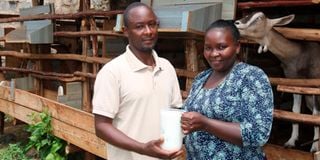No kidding, goats show couple where money is

Moses Mwaniki and his wife Rose Nyawira on their dairy goat farm in Juja, Kiambu County.
Sometime in 2017, Moses Mwaniki visited his mother in Embu and he was impressed by the goat’s project she had started.
Mwaniki, who owns a homestead in Juja, Kiambu County, says his mother had three dairy goats and they were offering her enough milk for her needs.
He got inspired and choose to emulate his mother by keeping the animals.
He started the project in 2018, setting up structures on one of his 30 by 60 feet plots. The other piece hosts his home.
“I bought two German Alpines does, which were producing milk, one going for Sh15,000 and the other Sh13,000,” says the 46-year-old.
He sourced the funds from his savings, says Mwaniki, who holds a diploma in electrical engineering –power option, adding that he has worked in a number of companies as a technician locally and in Afghanistan and Iraq.
After three years of doing the project for subsistence, Mwaniki went commercial.
“From the inquiries I received from locals, I realised got milk is popular. Most parents go for it because it helps guard against malnutrition in children.”
Mwaniki has three goat sheds, each unit raised 2 feet high from the ground.
Made of wood, timber, iron sheets and metal grills, the houses are sub-divided according to the age and size of the animals.
Currently, the farmer has 17 goats, seven producing milk, two in-calf and a buck for serving. The rest are kids.
He breeds the animals on the farm, thanks to the buck he bought from a farmer to avoid inbreeding.
According to the farmer who keeps German Alpine, crossbreeds of German Alpine and Toggenburg and German Alpine and Saanen, each goat produces two to three litres of milk per day. He sells a litre at Sh100 to contracted clients.
He feeds his animals hay made from grasses, napier grass, beans and maize stalks.
“I grow the fodder on a quarter-acre and a 60 by 30 feet piece of land,” he says. He also cultivates potato tubers.
As farmers lament high cost of commercial concentrates, Mwaniki formulates his own.
He uses ingredients such as maize, soya beans, sunflower, groundnuts and sorghum and minerals, a move that he says saves him up to 60 per cent.
“I buy ready-made materials and make the feed manually. I mix them in the following percentages to formulate a 100-kilo bag: Maize germ (43), wheat pollard (16), wheat bran (26), sunflower (5.5), cotton seed (6.75), animal feed lime (0.5), magadi (1), dcp mineral (1) and premix (0.25),” states the farmer.
Samuel Njoroge, an animal production specialist at Naivafresh Goat Dairies in Navaisha, says farmers should grow fodder like lucerne and Boma Rhodes for quality production.
“When mixed as dry matter, they give good protein content, highly palatable and digestible,” Njoroge advises.
Besides the feeds, the specialist further advises that for good milk production, one should go for quality breeds, explaining that genetics is an important factor to consider in the success of dairy goats, alongside the environment.
Mwaniki’s project is mainly for milk production, thus, when bucks hit three months, he sells them at least Sh5,000 each.
Social media sites and referrals are his marketing tools.





